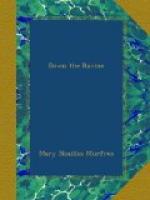Birt had felled a slender young ash, and was cutting it into lengths for the fireplace, when he noticed a squirrel, sleek woodland dandy, frisking about a rotten log at some little distance, by the roadside.
Suddenly the squirrel paused, then nimbly sped away. There was the sound of approaching hoofs along the road, and presently from around the curve a woman appeared mounted on a sorrel mare, and with a long-legged colt ambling in the rear.
It was Mrs. Griggs, setting out on a journey of some ten miles to visit her married daughter who lived on a neighboring spur. She had taken an early start to “git rid o’ the heat o’ the noon,” as she explained to Mrs. Dicey, who had run out to the rail fence when she reined up beside it. Birt dropped his axe and joined them, expecting to hear more about Nate’s grant and the gold mine. Rufe and Tennessee added their company without any definite intention. Pete and Joe were hurrying out of the house toward the group. All the dogs congregated, some of them climbing over the fence to investigate the colt, which was skittish under the ordeal. Even the turkey-gobbler, strutting on the outskirts of the assemblage, had an attentive aspect, as if he, too, relished the gossip.
Mrs. Griggs’s pink calico sunbonnet surmounted the cap with the explanatory ruffle. She carried a fan of turkey feathers, and with appropriate gesticulation, it aided in expounding to Mrs. Dicey the astonishing news that Nate had found a gold mine on vacant land, and had entered the tract. They intended to send specimens to the State Assayer, and they were all getting ready to begin work at once.
Another surprise to Birt! The ignorant mountain boy had never heard of the Assayer. But indeed Nate had only learned of the existence of the office and its uses during that memorable trip to Sparta.
The prideful Mrs. Griggs from her elevation, literal and metaphorical, supplemented all this by the creditable statements that Nate had turned twenty-one, had cast his vote, and had a right to a choice at the Cross-roads.
Then she chirruped to the rawboned sorrel mare, and jogged off down the road, followed by the frisky colt, whose long, slender legs when in motion seemed so fragile that it was startling to witness the temerity with which he kicked up his frolicsome heels. The dogs, with that odd canine affectation of having just perceived the intruders, pursued them with sudden asperity, barking and snapping, and at last came trotting nimbly home, wagging their tails and with a dutiful mien.
Mrs. Dicey went back into the house, and sat for a time in envious meditation, fairly silenced, and with her apron flung over her face. Then she fell to lamenting that she had been working all her life for nothing, and it would take so little to make the family comfortable, and that her children seemed “disabled somehow in thar heads, an’ though always rootin’ around in the woods, hed never fund no gold mine nor nuthin’ else out o’ the common.”




